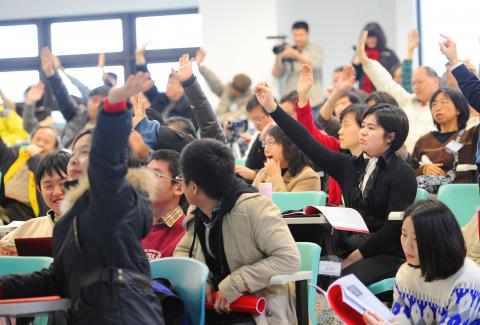A trade union comprised of faculty and staff from the nation’s institutes of higher education was officially established yesterday, calling for better labor conditions, democratic governance of universities, and academic freedom and fairness in distributing the nation’s educational resources.
According to Taiwan Higher Education Union statistics, there are at least 60,000 full-time and part-time professors, 30,000 staff and 120,000 research assistants and part-time workers in the country’s higher education institutes.
However, the number of contract or part-time faculty and staff is rapidly increasing, causing labor conditions to worsen in the past few years, it said.

Photo: Lo Pei-der, Taipei Times
There were 41,822 full-time and 27,111 part-time university faculty in 2001, but last year there were 49,929 full-time and 44,215 part-time university faculty, a 63 percent -increase in the number of part-time faculty, the union said.
At the establishment meeting held on National Taiwan University campus yesterday, Taiwan Higher Education Union preparatory committee convener Tai Po-fen (戴伯芬), a professor in the Department of Sociology at Fu Jan Catholic University, said the trade union was established because of an increasing number of cases of unreasonable dismissal of faculty, unreasonable pressure to produce research papers published in the Social Sciences Citation Index’s (SSCI) journals and other institutional problems.
“The main origin of these problems is the Ministry of Education,” National Chung Cheng University associate professor of politics Chen Shang-chih (陳尚志) said, adding that one major problem was the unbalanced distribution of higher education resources, with the higher-ranking schools getting most of the educational budget and research projects.
According to National Chung Cheng University Department of Mass Media associate professor and Taiwan Media Watch chairman Kuan Chung-hsiang (管中祥), a critical problem is the over-rigid accreditation system for departments and faculty, causing many professors to aim only at a few certain goals that the accreditation system rates, such as publishing papers in SSCI-listed journals.
Kuan said a large part of the accreditation system focused on research results and other aspects such as teaching.
“Some people say it’s ivory tower research, but with the rigid accreditation standards, it’s like forcing the faculty to do research in a small room up in the ivory tower,” Kuan said.

ANOTHER EMERGES: The CWA yesterday said this year’s fourth storm of the typhoon season had formed in the South China Sea, but was not expected to affect Taiwan Tropical Storm Gaemi has intensified slightly as it heads toward Taiwan, where it is expected to affect the country in the coming days, the Central Weather Administration (CWA) said yesterday. As of 8am yesterday, the 120km-radius storm was 800km southeast of Oluanpi (鵝鑾鼻), Taiwan’s southernmost tip, moving at 9kph northwest, the agency said. A sea warning for Gaemi could be issued tonight at the earliest, it said, adding that the storm is projected to be closest to Taiwan on Wednesday or Thursday. Gaemi’s potential effect on Taiwan remains unclear, as that would depend on its direction, radius and intensity, forecasters said. Former Weather Forecast

As COVID-19 cases in Japan have been increasing for 10 consecutive weeks, people should get vaccinated before visiting the nation, the Centers for Disease Control (CDC) said. The centers reported 773 hospitalizations and 124 deaths related to COVID-19 in Taiwan last week. CDC Epidemic Intelligence Center Director Guo Hung-wei (郭宏偉) on Tuesday said the number of weekly COVID-19 cases reported in Japan has been increasing since mid-May and surpassed 55,000 cases from July 8 to July 14. The average number of COVID-19 patients at Japan’s healthcare facilities that week was also 1.39 times that of the week before and KP.3 is the dominant

The Chinese Communist Party’s (CCP) working group for Taiwan-related policies is likely to be upgraded to a committee-level body, a report commissioned by the Mainland Affairs Council (MAC) said. As Chinese President Xi Jinping (習近平) is increasingly likely to upgrade the CCP’s Central Leading Group for Taiwan Affairs, Taiwanese authorities should prepare by researching Xi and the CCP, the report said. At the third plenary session of the 20th Central Committee of the CCP, which ended on Thursday last week, the party set a target of 2029 for the completion of some tasks, meaning that Xi is likely preparing to

US-CHINA TRADE DISPUTE: Despite Beijing’s offer of preferential treatment, the lure of China has dimmed as Taiwanese and international investors move out Japan and the US have become the favored destinations for Taiwanese graduates as China’s attraction has waned over the years, the Ministry of Labor said. According to the ministry’s latest income and employment advisory published this month, 3,215 Taiwanese university graduates from the class of 2020 went to Japan, surpassing for the first time the 2,881 graduates who went to China. A total of 2,300 graduates from the class of 2021 went to the US, compared with the 2,262 who went to China, the document showed. The trend continued for the class of 2023, of whom 1,460 went to Japan, 1,334 went to